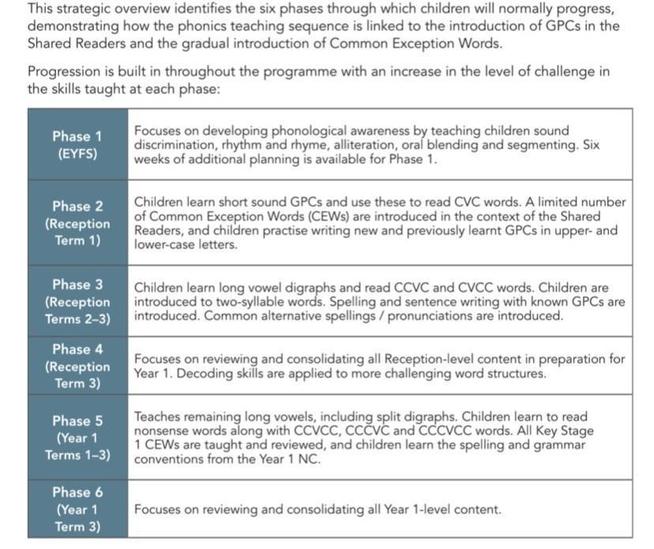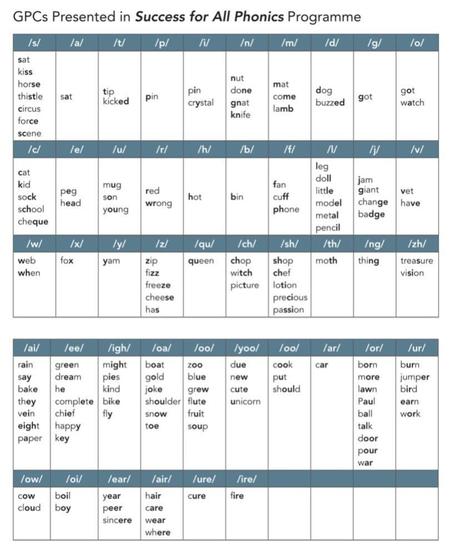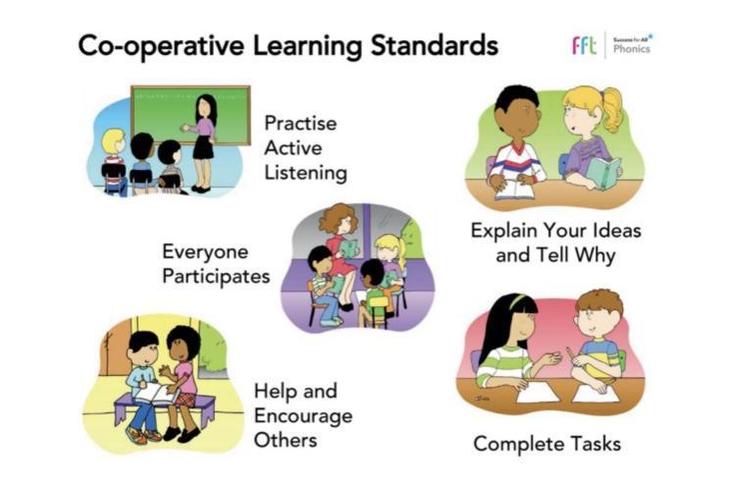Phonics and Early Reading
Phonics and Early Reading
Please see the document at the bottom of this page for a Glossary of Phonics terms which will prove very useful to support your children at home!
Here at Manor Wood Primary school, we teach Synthetic Phonics as an integrated approach to word reading that explicitly teaches the correspondences between individual letters or groups of letters and their related sounds (graphemes and phonemes), as well as the skill of blending the individual sounds together to read whole words. This skill can then be inverted so that words can be broken down (segmented) into their component sounds in order to spell them. Much evidence has been collated in recent years to show that teaching children to read using Synthetic Phonics has a positive effect on children’s long-term ability to read and comprehend texts (especially for those younger children who might otherwise have been identified as being in danger of falling behind).
Here at Manor Wood Primary, we moved to a new SSP (systematic synthetic phonics) scheme in September 2022 - FFT Success For All Phonics. We ensure that all teachers and teaching assistants are fully trained in this SSP programme so that we approach the teaching of early reading and writing in a cohesive approach and use consistent methods and terminology with all children across school.
At Manor Wood, we strongly believe that reading is a joy and something to share, explore, enjoy and relish together. For that reason, we are huge advocates of reading for pleasure and, alongside the teaching of phonics, we ensure we also focus on enjoyment and sharing books for pleasure, right from Early Years to Year 6!
Why do we teach phonics?
Although it is true that many English words are not entirely phonetically regular, the fact remains that around 50% of words are completely decodable if the reader has the necessary toolkit of GPCs (grapheme-phoneme correspondences) and of the remaining words, the majority have only one sound - usually a vowel sound - that is not regular. This means that if we teach children to read using a synthetic phonics approach, we are equipping them to read, at first try, at least half of all the words in the English language and have a good chance of working out the tricky GPC in most of the remaining words. This is especially helpful for our children, who come from diverse backgrounds and some may not speak English as a first language.
How do we teach phonics and early reading?
Our reception and nursery children learn through play together in collaboration within our mixed groups in our Early Years Foundation Stage. We teach Phonics and Early Reading through our new scheme, FFT Success for All. Daily phonics sessions are taught to all Reception and Year 1 children and children are supported to keep up, not catch up. Year 2 also follow this scheme until all children have reached the final phase of phonics and can apply this to their own reading and writing. Daily reading sessions take place using a text which applies and embeds the GPCs taught in the completed week’s phonics sessions and children make predictions, develop their comprehension, and apply the GPCs and tricky words they have learnt that week to their reading and writing within these sessions. Reading will continue to be practised and assessed on a one to one basis.
In KS1, children continue to have a daily phonics and reading session (we share the text we have been studying at the end of each week on Seesaw) but are taught reading as part of the whole class Manor Wood Text-Led Literacy Process. Specific vocabulary, fluency and comprehension skills are taught and practised around a whole class text. See our Literacy section on our website for more information! Home Reading books are assigned for individual children closely matched to their precise phonic ability, only including GPCs which are fully decodable for the child.
We encourage children at every stage of school to be reading and sharing books for pleasure and we have a well-stocked exciting outdoor “story box” as well as class book corners where children can choose any book they would like. Children in KS1 and KS2 have home reading journals which are monitored by teachers to ensure children prioritise reading at home. We aim for at least three sessions of home reading per week, but many avid readers here at Manor Wood far exceed that total!
We teach Phonics and Early Reading through our validated scheme, FFT Success for All. Daily phonics sessions are taught to all Reception and Year 1 children and children are supported to keep up, not catch up. Year 2 also follow this scheme until all children have reached the final phase of phonics and can apply this to their own reading and writing. Daily whole group reading sessions will also be in place using a text which applies and embeds the GPCs taught in the completed week’s phonics sessions. Reading will continue to be practised and assessed on a one to one basis.
For phonics, our children are taught in mixed groups for their daily sessions, according to their assessed understanding and attainment. Reading is taught in daily one to one sessions according to each child’s individual level and home reading books which are carefully matched to this phonetically decodable level are assigned to each child.
We prioritise ensuring children love books here at Manor Wood. Story time is something that we make sure all stages and year groups enjoy every day. See our carefully constructed Reading for Enjoyment Story Spine for some of the books our teachers read to our children for enjoyment from Early Years to Year 6.
FFT Success for All Phonics
FFT Success for All phonics is a complete Systematic Synthetic Phonics (SSP) programme validated by the DfE. It provides 68 fully decodable reading books for the application of phonics to teach reading, and we follow their planning for daily phonics and reading sessions. The daily lesson plans cover all of the main Grapheme-Phoneme Correspondences (GPCs) and Common Exception Words (CEWs) to provide children with the phonic knowledge and skills required for success in the Year 1 Phonics Screening check, as well as providing firm foundations for reading and writing. The programme is designed to be taught from Reception to Year 1 m, with a consolidation phase in Year 2. However, we also identify need and will effectively teach children new to English or learning phonics for the first time using this SSP programme. Children in Year 3 who do not pass the resit of the Phonics Screening Check will continue to accesss phonics teaching and additional support into KS2. FFT’s Lightning Squad tutoring support scheme is fully aligned with our phonics programme and, from September when we launch the new SSP programme, will be used to provide catch up support for children in Year 1-6 where necessary.
The phonics programme sequentially builds on prior knowledge. See below for the order in which these are taught:


Each session begins with a revisit and review of previous learning, the introduction of new GPCs or CEWs, opportunity to orally rehearse, segment and blend and also to write phonemes, words and finally whole sentences as children progress. The daily reading sessions apply the GPCs and CEWs that the children have already learnt, so that they are fully decodable and build children’s confidence. Teachers lead the sessions but children also work collaboratively in groups and pairs, practicing decoding, blending, fluency, expression, and developing comprehension. Children ask questions, make predictions and discuss answers to retrieval, inference and vocabulary questions. They also have a writing focus where children can practise forming letters, words and sentences as they progress.
Assessment is formative and informs teacher planning as well as identifying children who need keep-up sessions and additional phonics consolidation and practise throughout the curriculum.
Pedagogy - Co-operative Learning
Success for All Phonics is based on an evidence-based pedagogy that is designed to support children's social and emotional development, enabling them to enjoy school, focus on learning and be academically successful. Learning skills are developed by teachers explicitly modelling behaviour for learning. Positive feedback helps children to understand when they meet expectations and promotes an environment where the children are motivated and engaged.
Co-operative Learning is an essential component of the Success for All Phonics programme. Working with other children ensures that everyone in the class, not just those children who are actively called upon, has the opportunity to participate in the lessons by answering questions and discussing ideas and concepts. Our staff are fully trained to ensure that Co-operative Learning is working well, so that the classroom is buzzing during partner and team activities as the children work together to become better readers and (in Year 1) Super Teams. The children are focused and engaged in helping one another to work out how to say words, to understand what they are reading, to read fluently and to write accurately.
In Reception, the children work in partnerships, engaging in Partner Talk and generally extending their own thinking about decoding and comprehension. They do this by co-creating a safe and supportive environment in which to practise their burgeoning skills around working out new words and their meanings, reading fluently and understanding what they read. By Year 1, this partnership is extended to children working in teams of 4-5 children (although the children will still continue to work with a partner).
The Co-operative Learning standards are five behaviours for learning that are introduced one at a time at the start of the year through explicit teacher modelling and feedback. Effective use of the Co-operative Learning standards motivates our children to become more engaged, interdependent members of the classroom.
- Practise Active Listening
- Explain Your Ideas and Tell Why
- Everyone Participates
- Help and Encourage Others
- Complete Tasks

Glossary of Phonics terms
Get In Touch
- Carr Manor Road,
Leeds,
LS17 5DJ - 0113 268 9160
- office@manorwood.owlcotesmat.org

